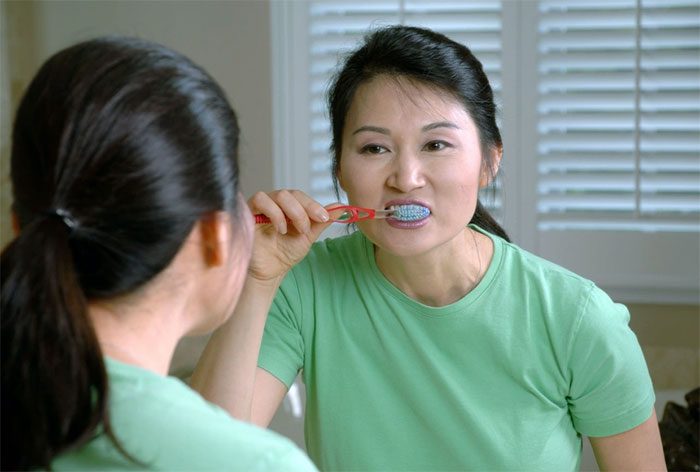For many people, the most frightening aspect of wisdom tooth extraction is the pain and discomfort in the days that follow. However, proper wound care can accelerate recovery.
What to Do Immediately After Tooth Extraction?
According to Dr. Luu Ha Thanh from the Dental Department at Military Central Hospital 108, after extracting the wisdom tooth, patients need to bite down on the gauze placed in their mouth and keep it in the position where the dentist just extracted the tooth. The gauze can be removed after about an hour if bleeding is well controlled.
“On the other hand, if the surgical area continues to bleed, continue biting on a new piece of gauze for another 30-45 minutes until the bleeding stops completely,” Dr. Thanh advises.
The specialist also notes that patients should start rinsing their mouths with salt water 24 hours after the surgery. However, patients should rinse gently to avoid damaging the surgical area. Additionally, she emphasizes that everyone should rinse their mouths about 2-3 times a day, especially after meals.
Even if the above steps are followed correctly, some issues may arise immediately after wisdom tooth extraction:
Bleeding: After surgery, some bleeding may occur. Dr. Thanh mentions that it is not uncommon for bleeding to happen even 24-48 hours post-procedure. However, there is no need to be overly concerned about this issue.
According to the expert, if bleeding is excessive, patients can try adjusting the position of the gauze they are biting. Prolonged bleeding may result from the gauze not applying enough pressure to the extraction site.
Dr. Thanh also recommends that patients sit upright, avoid physical activities, and apply a cold compress continuously for a few hours to reduce swelling.
We can apply the cold compress for about 15 minutes and then rest for 15 minutes afterward. The expert emphasizes that continuous ice application should be avoided as it may cause frostbite on the face.
Moreover, if bleeding persists, patients should contact their doctor immediately for timely intervention.
Pain: Typically, after tooth extraction, doctors will prescribe pain relief medication. Therefore, patients shouldn’t worry too much about pain once the anesthetic wears off. Furthermore, doctors will guide patients on how to manage pain effectively. Hence, everyone should pay attention and ensure they follow these steps correctly.
Dr. Thanh also highlights some dietary considerations immediately after tooth extraction. Specifically, patients should opt for soft, easy-to-swallow foods that require minimal chewing, such as noodles, porridge, and soup, or cut food into small pieces before consuming.
“Patients can also include yogurt and fruit juices to supplement vitamins for their bodies,” she adds.
Day 2 After Tooth Extraction
A common issue that arises on the second day after wisdom tooth extraction is swelling in the surgical area.
According to Dr. Luu Ha Thanh, swelling is a completely normal phenomenon following tooth extraction. However, patients should be aware that swelling usually peaks within the first 1-2 days post-surgery.

Oral hygiene is crucial after tooth extraction, but care should be taken not to damage the wound. (Illustrative image: National Cancer Institute).
At this time, individuals can minimize swelling by applying a cold compress (wrapped in a cloth) to the cheek next to the surgical area. Continue applying the compress for 15 minutes and resting for 15 minutes during the first 24-48 hours.
Patients also need to ensure they take their medications as prescribed by their doctor during this period. Adhering to treatment will help alleviate pain and swelling.
Dr. Thanh also emphasizes that a crucial task during this stage is maintaining proper oral hygiene.
According to the expert, everyone should continue rinsing their mouth with salt water regularly, at least 2-3 times a day. Patients can start brushing their teeth normally but need to do so gently and avoid actions that cause pain to the affected gums.
“Wisdom teeth are considered the most complex teeth as they often grow misaligned or impacted, causing pain and difficulty during surgery. Therefore, the removal and care of oral hygiene after extraction are very important. If patients experience any complications after extraction, they should consult their doctor for a check-up,” Dr. Thanh concludes.


















































